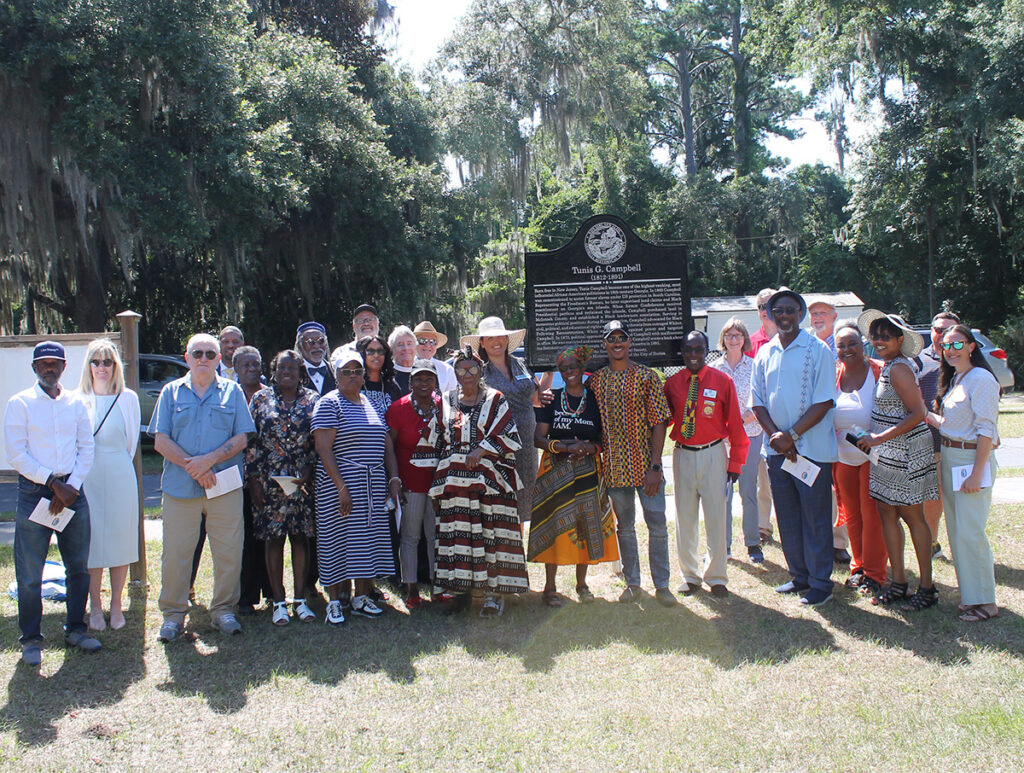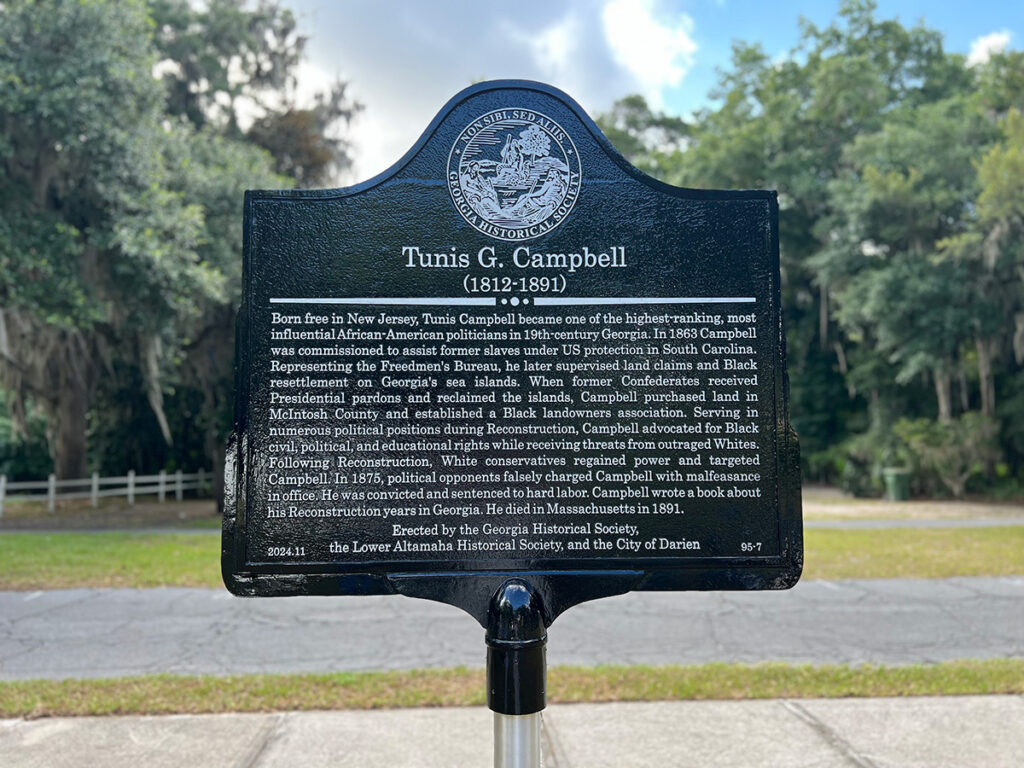
Darien, GA, June 20, 2024—On Thursday, June 20, 2024, the Georgia Historical Society (GHS) unveiled a new historical marker about Tunis G. Campbell (1812-1891) in Darien in partnership with the Lower Altamaha Historical Society and the City of Darien. The marker details Campbell’s life and political career, including how he became one of the highest-ranking, most influential African-American politicians in 19th-century Georgia.
“Tunis Campbell was one of the most consequential people in Reconstruction Georgia,” said Dr. Stan Deaton, Dr. Elaine B. Andrews Distinguished Historian, GHS. “He is long overdue for a historical marker that recognizes the critical role he played as one of the most important African-American leaders in the aftermath of the Civil War.”
“Tunis Campbell gets his recognition for his outstanding work in the state of Georgia, and I, for one, have followed in his powerful humanitarian and political footsteps.” said Griffin Lotson, Mayor Pro Tem, City of Darien. “He served the United States government in a national appointment position, he served on a state level and local level, and now I, following his example, am proud to say I have learned a lot from the examples of such an outstanding gentleman, who even during hard times, became a champion to many. The City of Darien, Georgia, Mayor, Council, and City Manager welcome the Tunis Campbell historical marker to the City of Darien’s Inverness Square Park.”
After his positions with the U.S. government ended, Campbell remained in Georgia and became a community and political leader. He purchased more than 1,200 acres in McIntosh County, established an association of Black landowners, and built an unprecedented political base in Coastal Georgia that protected freedmen from White backlash. Campbell served in the State legislature until the end of Reconstruction, despite threats and physical violence.
"While representing our local historical community, the Lower Altamaha Historical Society is proud to partner with the Georgia Historical Society and City of Darien to commemorate the enduring legacy of Tunis Campbell, a trailblazer in the fight for justice and equality during and after the American Civil War,” said Paul Nix, Lower Altamaha Historical Society President. “Campbell’s legacy is a testament to the power of resilience and the relentless pursuit of justice. His work laid the groundwork for future generations of civil rights leaders and continues to inspire those who fight for equality today. As we honor his contributions, we reaffirm our commitment to building a more just and equitable society."
White conservatives regained State power in 1871, sometimes by targeting Black politicians like Campbell, and they pushed to overturn the gains made by African Americans during Reconstruction. In 1876, Campbell was falsely charged of malfeasance in office. His trial resulted in conviction, and he spent a year in a convict labor camp. After release, Campbell moved back North, where he died in 1891.
The marker dedication took place at Inverness Square in Darien. Speakers included Elyse Butler, Manager of Programs and Special Projects, GHS; Mother Alberta Mabry, who poured libations; Griffin Lotson, Mayor Pro Tem, City of Darien; Richard Braun, City Manager, City of Darien; The Honorable Dr. William Collins, Councilman, City of Darien; Paul Nix, President, Lower Altamaha Historical Society; and Dr. Stan Deaton, Dr. Elaine B. Andrews Distinguished Historian, GHS.

The marker text reads:
Tunis G. Campbell (1812-1891)
Born free in New Jersey, Tunis Campbell became one of the highest-ranking, most influential African-American politicians in 19th-century Georgia. In 1863 Campbell was commissioned to assist former slaves under US protection in South Carolina. Representing the Freedmen’s Bureau, he later supervised land claims and Black resettlement on Georgia’s sea islands. When former Confederates received Presidential pardons and reclaimed the islands, Campbell purchased land in McIntosh County and established a Black landowners association. Serving in numerous political positions during Reconstruction, Campbell advocated for Black civil, political, and educational rights while receiving threats from outraged Whites. Following Reconstruction, White conservatives regained power and targeted Campbell. In 1875, political opponents falsely charged Campbell with malfeasance in office. He was convicted and sentenced to hard labor. Campbell wrote a book about his Reconstruction years in Georgia. He died in Massachusetts in 1891.
Erected by the Georgia Historical Society, the Lower Altamaha Historical Society, and the City of Darien
For more information about the Tunis G. Campbell (1812-1891) historical marker dedication or the Georgia Historical Society marker program, please contact Elyse Butler, Manager of Programs and Special Projects, at 912.651.2125, ext. 119, or by email at ebutler@georgiahistory.com.
###
ABOUT THE GEORGIA HISTORICAL SOCIETY
The Georgia Historical Society (GHS) is the premier independent statewide institution responsible for collecting, examining, and teaching Georgia history. GHS houses the oldest and most distinguished collection of materials related exclusively to Georgia history in the nation.
To learn more visit georgiahistory.com.
ABOUT THE GEORGIA HISTORICAL MARKER PROGRAM
The Georgia Historical Marker Program is an important part of the Georgia Historical Society’s (GHS) statewide educational mission. Through a public-private partnership with the State of Georgia, GHS is responsible for erecting new historical markers and maintaining more than 2,000 markers installed by the State prior to the program’s privatization in 1998. Online mapping tools allow users to explore themed marker trails and design custom driving routes. Visit georgiahistory.com for more ways to use Georgia’s historical markers and experience history where it happened.
LOWER ALTAMAHA HISTORICAL SOCIETY
The Mission of the Lower Altamaha Historical Society is to preserve and disseminate the history of McIntosh.
